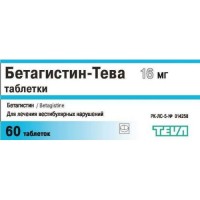Mirtel® (Mirtazapine) 30 mg, 30 tablets
- $85.00
What is Mirtel® (Mirtazapine)?
Mirtel® is a medication that contains mirtazapine as its active ingredient. It is commonly prescribed for the treatment of major depressive disorder (MDD) in adults.
Mirtazapine belongs to the tetracyclic antidepressant class, which works by affecting the levels of specific neurotransmitters in the brain, such as serotonin and norepinephrine.
These neurotransmitters play a key role in regulating mood, sleep, and emotional balance.
By modulating these chemicals, Mirtel® helps to alleviate symptoms of depression, such as persistent sadness, lack of energy, sleep disturbances, and appetite changes.
Mirtel® is typically used when patients experience moderate to severe depression, and it is known to help improve mood, increase feelings of well-being, and restore interest in daily activities.
One of its advantages is its ability to promote better sleep, as it has sedative properties, which can be beneficial for patients who suffer from insomnia alongside depression.
The medication is often well-tolerated and can begin to show improvements within one to two weeks of consistent use, although full therapeutic effects may take longer.
How does Mirtel® work?
Mirtel® helps by enhancing the levels of serotonin and norepinephrine, neurotransmitters in the brain that play a key role in mood regulation. This helps alleviate the symptoms of depression, improving mood, sleep, and appetite while reducing feelings of sadness and anxiety.
Who should not take Mirtel®?
Mirtel® should not be used in individuals who are allergic to mirtazapine or any of its ingredients. It is also not suitable for those who are taking or have recently taken monoamine oxidase inhibitors (MAOIs), a type of antidepressant. People with lactose intolerance, galactose malabsorption, or Lapp lactase deficiency should avoid Mirtel®, as it contains lactose.
Additionally, Mirtel® is not recommended for children and adolescents under 18 years of age due to a higher risk of suicidal thoughts and behavior in this age group.
What precautions should I take before using Mirtel®?
Before starting Mirtel®, inform your doctor if you have a history of severe skin reactions, including Stevens-Johnson syndrome (SJS) or toxic epidermal necrolysis (TEN). If any symptoms of these serious skin reactions occur, stop taking Mirtel® and seek medical attention immediately. Patients with epilepsy, liver or kidney problems, heart conditions, or low blood pressure should use Mirtel® under close medical supervision.
Can I take Mirtel® with other medications?
Mirtel® may interact with several medications, so it's important to inform your doctor about any other drugs you are taking. Avoid combining Mirtel® with MAOIs, as this can lead to serious health risks. It can also increase sedation when used with benzodiazepines, opioids, and alcohol. Combining Mirtel® with serotonergic medications (such as tramadol or St. John's Wort) may increase the risk of serotonin syndrome, a potentially life-threatening condition.
What are the possible side effects of Mirtel®?
The most common side effects of Mirtel® include:
- Increased appetite and weight gain
- Sleepiness or sedation
- Dry mouth
- Dizziness or fatigue
In rare cases, Mirtel® may cause more serious side effects, such as:
- Suicidal thoughts or behavior, especially in younger adults
- Severe skin reactions like Stevens-Johnson syndrome
- Blood disorders, including agranulocytosis (low white blood cell count)
- Serotonin syndrome, which can cause confusion, rapid heart rate, and muscle rigidity
How should I store Mirtel®?
Store Mirtel® at a temperature no higher than 30°C (86°F), in a dry place, and keep it out of reach of children.
Do not use the medication after its expiration date.
How should Mirtel® be taken?
Mirtel® is usually taken once a day, preferably at night, as it may cause drowsiness.
The starting dose is often 15-30 mg, with a maintenance dose of 15-45 mg depending on the patient’s response to treatment.
It typically takes 1-2 weeks to start feeling the effects, but full improvement may take up to 4 weeks.
Treatment should continue for at least six months to ensure symptoms do not return.
Avoid stopping Mirtel® suddenly, as this may lead to withdrawal symptoms such as dizziness, nausea, and agitation.
Always consult your doctor for guidance on gradually reducing the dosage if needed.
Can pregnant or breastfeeding women take Mirtel®?
Mirtel® should only be used during pregnancy if absolutely necessary. While studies in animals have not shown significant harm, human data is limited. If Mirtel® is used during pregnancy, newborns may need to be monitored for withdrawal symptoms after birth. Mirtel® can pass into breast milk in small amounts, so breastfeeding mothers should consult their healthcare provider to weigh the benefits and risks.








